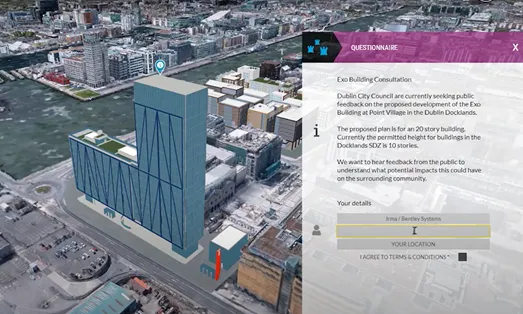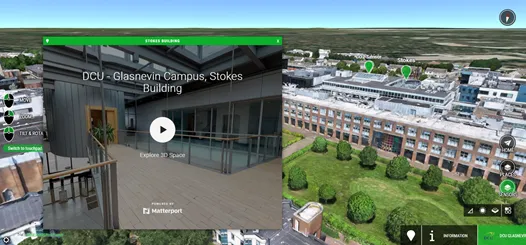Dublin City Council - Interreg Twin for Resilience (T4R) Pilot Action Project
Different departments of Dublin City Council (DCC) have been experimenting with state-of-the-art 3D modelling technologies such as drones, building information models, and LIDAR scanners for surveying, mapping, and data collection. DCC also realises a massive opportunity to leverage local digital twins (LDT) for effective engagement with key stakeholders and communities on future proposals and investments planned for the city.
Through T4R, DCC aims to showcase the value of LDT as a visual tool that can integrate diverse datasets in a unified geospatial platform and communicate relevant data insights to key decision-makers, local stakeholders, and communities. Its well-placed smart district collaborative programme and long-standing partnerships with Industry and academia contribute to the research and technical expertise needed for LDT design.
In 2019, a 3D Hackathon was organised (120+ participants) by DCC, uncovering new insights into the potential of 3D models for city planning. It resulted in many innovative applications and ideas from the industry and academia. DCC through its Smart City programme also established an innovation partnership with Bentley Systems to explore the potential of using digital twins to support public engagement for future city proposals. A digital twin in this context is a virtual representation of a physical place - so buildings, streets, and assets are all digitised into a 3D virtual environment allowing the data to be visualised interactively.

This work was initially centered around the Smart Docklands district where a prototype 3D model and engagement interface were developed in 2020 using Open Cities Planner. The model is further being experimented using gaming engines and immersive solutions for an interactive user experience for the community. The partnership with Bentley Systems was further extended to demonstrate the potential of campus digital twins using the Smart DCU sandbox environment and Dublin Fire Brigade for its pre-incident planning and emergency response use cases.

T4R frameworks and resilient pilot action are expected to provide lessons and build local capacities within the organization to adopt digital twin technology for good. DCC will implement two use cases for its pilot action aiming to forge a better understanding of the value of new proposals for resilient territorial planning. The first use case focuses on a multi-thematic temporal planning experience for everyone to visualize the spatial transformation of the city’s historic Docklands and the second use case highlights the value of ongoing active travel investments at a city-wide scale.
To learn more about his project visit https://t4r.nweurope.eu/
